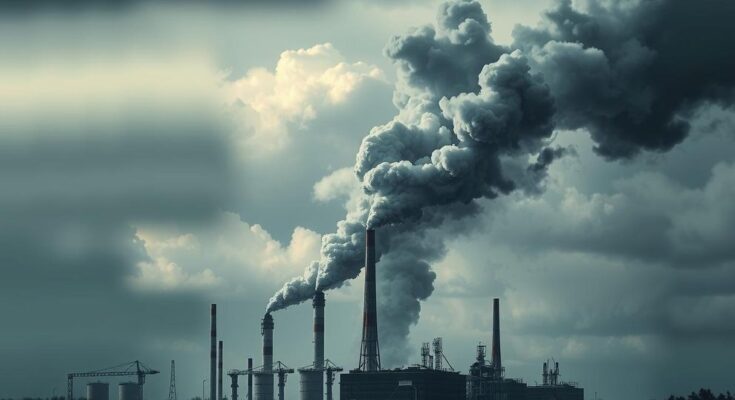China has missed its 2024 carbon emissions target, with a 3.4% reduction in carbon intensity instead of the planned 3.9%. The failure raises concerns about achieving carbon neutrality by 2060 and contrasts with rapid renewable energy advancements. China’s reliance on coal amid rising energy demands poses further challenges, emphasizing the need for structural reforms in the energy sector to meet long-term climate goals.
China has recently fallen short of its carbon emissions target for 2024, raising serious concerns regarding its ambitions for achieving carbon neutrality. The National Bureau of Statistics reported that carbon intensity, which indicates emissions per unit of GDP, declined by 3.4 percent, failing to meet the planned 3.9 percent reduction. This setback highlights a broader struggle as China also lags behind its aim to cut carbon intensity by 18 percent from 2020 to 2025, as outlined by the Chinese Communist Party in its latest five-year plan.
President Xi Jinping’s “dual targets” set goals for peak emissions before 2030 and carbon neutrality by 2060, making China’s performance critical globally. As the world’s largest polluter, accounting for approximately 30 percent of global emissions, China’s actions significantly influence international efforts to maintain temperature rise below 1.5 degrees Celsius—an essential threshold established by the United Nations to avoid severe climate crises.
The climate challenge intensified as 2024 became the first year in recorded history where global temperatures exceeded this critical limit. While carbon intensity is a vital metric for gauging decarbonization, Muyi Yang, a senior analyst at Ember, pointed out that emissions reduction has not kept pace with economic growth. Despite economic growth of 5 percent in 2024, electricity demand surged by 6.8 percent, leading to a year-on-year rise of 0.8 percent in carbon emissions.
Record heatwaves have further complicated emission reduction efforts, impacting energy production, particularly in hydropower. Authorities have had to rely more heavily on coal to compensate for these production gaps. Nevertheless, China has shown commendable advancements in renewable energy, with wind and solar sources fulfilling 14.5 percent of total energy demand and hydropower contributing another 13.4 percent. Notably, approximately 75 percent of the energy demand increase was met by renewables, equating to clean energy production comparable to Germany’s annual consumption.
These developments have been substantially driven by government initiatives, with Xi Jinping’s environmental ideology underscoring the necessity for ecological progress. In 2021, he directed that high-emission projects be dismantled, and the initiation of the world’s largest carbon trading market reflects a strategic move towards greener policies. Analysts indicate that a shift from traditional low-value manufacturing to green technologies, such as solar panels and electric vehicles, is underway, but the pace of this transition remains uncertain.
As China prepares to unveil new emissions targets for 2026 to 2030 alongside its upcoming five-year plan, experts remain cautiously optimistic. While expectations suggest that China will peak carbon emissions ahead of the 2030 target, the transition away from coal and substantial structural reforms in the energy sector will be pivotal to achieving long-term carbon neutrality.
China’s failure to meet its 2024 emissions target and its broader challenges in decarbonization highlight significant concerns regarding its commitment to global climate goals. Despite impressive advancements in renewable energy, structural changes are essential for China to meet its long-term targets of peak emissions by 2030 and carbon neutrality by 2060. Future carbon targets set to be released will influence the climate policy landscape substantially, emphasizing the need for immediate action to ensure sustainable energy reforms.
Original Source: www.aljazeera.com




